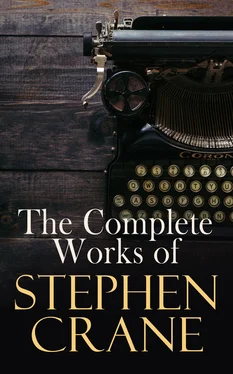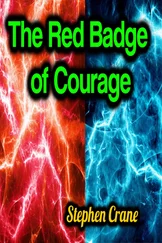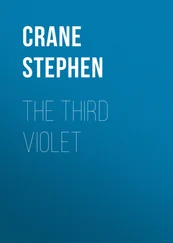‘Stop your swearin’, George Kelcey; I won’t have yeh talk so before me! I won’t have it! Stop this minute! Not another word! Do yeh think I’ll allow yeh t’ swear b’fore me like that? Not another word! I won’t have it! I declare I won’t have it another minute!’
At first her projected words had slid from his mind as if striking against ice, but at last he heeded her. His face grew sour with passion and misery—he spoke in tones dark with dislike.
‘Th’ ‘ell yeh won’t? Whatter yeh goin’ t’ do ‘bout it?’ Then, as if he considered that he had not been sufficiently impressive, he arose and slowly walked over to her. Having arrived at point-blank range he spoke again. ‘Whatter yeh goin’ t’ do ‘bout it?’ He regarded her then with an unaltering scowl, albeit his mien was as dark and cowering as that of a condemned criminal.
She threw out her hands in the gesture of an impotent one. He was acknowledged victor. He took his hat and slowly left her.
For three days they lived in silence. He brooded upon his mother’s agony and felt a singular joy in it. As opportunity offered, he did little despicable things. He was going to make her abject. He was now uncontrolled, ungoverned; he wished to be an emperor. Her suffering was all a sort of compensation for his own dire pains.
She went about with a gray, impassive face. It was as if she had survived a massacre in which all that she loved had been torn from her by the brutality of savages.
One evening at six he entered and stood looking at his mother as she peeled potatoes. She had hearkened to his coming listlessly, without emotion, and at his entrance she did not raise her eyes.
‘Well, I’m fired!’ he said suddenly.
It seemed to be the final blow. Her body gave a convulsive movement in the chair. When she finally lifted her eyes, horror possessed her face. Her underjaw had fallen. ‘Fired? Outa work? Why—George?’
He went over to the window and stood with his back to her. He could feel her gray stare upon him.
‘Yes! Fired!’
At last she said:
‘Well, whatter yeh goin’ t’ do?’
He tapped the pane with his finger-nail.
He answered in a tone made hoarse and unnatural by an assumption of gay carelessness:
‘Oh, nothin’!’
She began, then, her first weeping. ‘Oh—George—George—George—’
He looked at her, scowling.
‘Ah, whatter yeh givin’ us? Is this all I git when I come home f’m being fired? Anybody ‘ud think it was my fault. I couldn’t help it.’
She continued to sob in a dull, shaking way. In the pose of her head there was an expression of her conviction that comprehension of her pain was impossible to the universe.
He paused for a moment, and then, with his usual tactics, went out, slamming the door. A pale flood of sunlight, imperturbable at its vocation, streamed upon the little old woman, bowed with pain, forlorn in her chair.
Table of Contents
Kelcey was standing on the corner next day when three little boys came running. Two halted some distance away, and the other came forward.
He halted before Kelcey, and spoke importantly.
‘Hey, your ol’ woman’s sick.’
‘What?’
‘Your ol’ woman’s sick.’
‘Git out!’
‘She is, too!’
‘Who tol’ yeh?’
‘Mis’ Callahan. She said fer me t’ run an’ tell yeh. Dey want yeh.’
A swift dread struck Kelcey. Like flashes of light little scenes from the past shot through his brain. He had thoughts of a vengeance from the clouds.
As he glanced about him the familiar view assumed a meaning that was ominous and dark. There was prophecy of disaster in the street, the buildings, the sky, the people. Something tragic and terrible in the air was known to his nervous, quivering nostrils. He spoke to the little boy in a tone that quavered.
‘All right!’
Behind him he felt the sudden contemplative pause of his companions of the gang. They were watching him. As he went rapidly up the street he knew that they had come out to the middle of the walk and were staring after him. He was glad that they could not see his face, his trembling lips, his eyes quavering in fear.
He stopped at the door of his home and stared at the panel as if he saw written thereon a word. A moment later he entered. His eye comprehended the room in a frightened glance.
His mother sat gazing out at the opposite walls and windows. She was leaning her head upon the back of the chair. Her face was overspread with a singular pallor, but the glance of her eyes was strong, and the set of her lips was tranquil.
He felt an unspeakable thrill of thanksgiving at seeing her seated there calmly.
‘Why, mother, they said yeh was sick,’ he cried, going toward her impetuously. ‘What’s th’ matter?’
She smiled at him.
‘Oh, it ain’t nothin’! I on’y got kinda dizzy, that’s all.’
Her voice was sober, and had the ring of vitality in it.
He noted her commonplace air. There was no alarm or pain in her tones, but the misgivings of the street, the prophetic twinges of his nerves, made him still hesitate.
‘Well—are you sure it ain’t? They scared me ‘bout t’ death.’
‘No, it ain’t anything, o’ny some sorta dizzy feelin’. I fell down b’hind th’ stove. Missis Calahan, she came an’ picked me up. I must ‘a laid there fer quite a while. Th’ doctor said he guessed I’d be all right in a couple ‘a hours. I don’t feel nothin’!’
Kelcey heaved a great sigh of relief.
‘Lord, I was scared!’ He began to beam joyously, since he was escaped from his fright. ‘Why, I couldn’t think what had happened,’ he told her.
‘Well, it ain’t nothin’,’ she said.
He stood about awkwardly, keeping his eyes fastened upon her in a sort of surprise, as if he had expected to discover that she had vanished. The reaction from his panic was a thrill of delicious contentment. He took a chair and sat down near her, but presently he jumped up to ask:
‘There ain’t nothin’ I can get for yeh, is ther?’
He looked at her eagerly. In his eyes shone love and joy. If it were not for the shame of it, he would have called her endearing names.
‘No, ther ain’t nothin’,’ she answered. Presently she continued, in a conversational way: ‘Yeh ain’t found no work yit, have yeh?’
The shadow of his past fell upon him then, and he became suddenly morose. At last he spoke in a sentence that was a vow, a declaration of change.
‘No, I ain’t, but I’m going t’ hunt fer it hard, you bet.’
She understood from his tone that he was making peace with her. She smiled at him gladly.
‘Yer a good boy, George!’ A rediance from the stars lit her face.
Presently she asked:
‘D’ yeh think yer old boss would take yeh on ag’in if I went t’ see him?’
‘No,’ said Kelcey at once. ‘It wouldn’t do no good! They got all th’ men they want. There ain’t no room there. It wouldn’t do no good.’ He ceased to beam for a moment as he thought of certain disclosures. ‘I’m goin’ t’ try to git work everywheres. I’m going t’ make a wild break t’ get a job, an’ if there’s one anywheres I’ll get it.’
She smiled at him again.
‘That’s right, George!’
When it came supper-time he dragged her in her chair over to the table, and then scurried to and fro to prepare a meal for her. She laughed gleefully at him. He was awkward and densely ignorant. He exaggerated his helplessness sometimes until she was obliged to lean back in her chair to laugh. Afterward they sat by the window. Her hand rested upon his hair.
Table of Contents
Читать дальше












